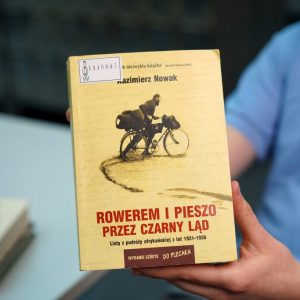“Kazimierz Nowak’s journey, which he made along the African continent by bicycle, on foot, on horseback, and in a dugout canoe is one of the most daring travel achievements in history. His letters and photographs are a repository of knowledge about Africa of the 1930s,” this is how Jakub Gniadzik from the University of Warsaw Library described the book “Across the Dark Continent” in the next episode of the “Read with the UW” series.
Jakub Gniadzik graduated with a degree in Scientific Information and Library Studies from the University of Warsaw. For almost ten years, he has been associated with the University of Warsaw Academic Choir, in which he sings baritone. He has participated with the ensemble in dozens of various musical projects in Poland and abroad.
Since 2021, he has been employed as a junior librarian in the Information Services and Training Department of the University of Warsaw Library (BUW).
Unconventional globetrotter
“Across the Dark Continent is an account of Kazimierz Nowak’s solo expedition through Africa. During the journey, which lasted from 1931 to 1936, he traversed the continent from north to south and came back. During this time, he travelled by bicycle, on foot, in a dugout canoe, on horseback and on a camel,” Jakub Gniadzik from the BUW explained.
Kazimierz Nowak was a Polish traveller, photographer and journalist born in 1897. He is considered a pioneer of modern reportage. He lived with his wife and children in Poznań, where he worked as an accountant in one of the banks. When he lost his job and found himself in financial difficulties, he sought a living as an itinerant photographer.
He travelled extensively by bicycle through Poland and Europe, and in 1931 he reached Africa. He set off from Tripoli, then in Italy, and cycled across the entire European continent. In April 1934, he reached the Cape Needle in present-day South Africa. Then, he headed back north almost without rest.
Travel letters
During his travels, Kazimierz Nowak constantly wrote letters to his wife Maria, who submitted them for publication in the current press. Over the course of five years, the traveller sent 1,242 letters to Poland.
His written accounts of Africa, accompanied by unique photographs, were regularly published in the form of reports in, for instance, Dziennik Poznański, Kurier Poznański, Kurier Warszawski and Przegląd Powszechny, as well as in British, French and Italian magazines.
“The extensive photographic material attached to the letters, which presented African wildlife and customs of the local population, was probably the first and the only such a depiction on cellulose film in history,” Jakub Gniadzik emphasised.
Nowak’s photographs show the various stages of his journey, capturing indigenous inhabitants, local flora and fauna, and stunning African landscapes. They show that the traveller avoided the main transport routes and reached places where the Europeans had not yet been at that time.
“During his African journey, he often had to rely on the help of the natives, who gave him food and water, and even offered him shelter when malaria prevented him from getting out of bed,” Jakub Gniadzik said.
Unfortunately, on his return to Poland, Kazimierz Nowak paid the ultimate price for his success. Recurring malaria, exhaustion from tropical diseases and progressive pneumonia caused his death at the early age of forty.
For the young and the old
Almost sixty years later, letters and reports published by Kazimierz Nowak became objects of interest for Łukasz Wierzbicki. He found, collected, and processed them; then, he provided an introduction and published as a book in 2000.
“Since then, Across the Dark Continent has gained unflagging popularity and has already been published in seven editions,” Jakub Gniadzik added.
On the basis of selected reportages by Kazimierz Nowak, Łukasz Wierzbicki published another book entitled Kazik in Africa. Aimed at the youngest readers, the book quickly made it to the list of compulsory school reading, and, in October 2009, it was nominated for the Kornel Makuszyński Polish National Literary Award.
The books Across the Dark Continent and Kazik in Africa are available in the University of Warsaw Library in free access in the “History” section as well as in the storeroom.








